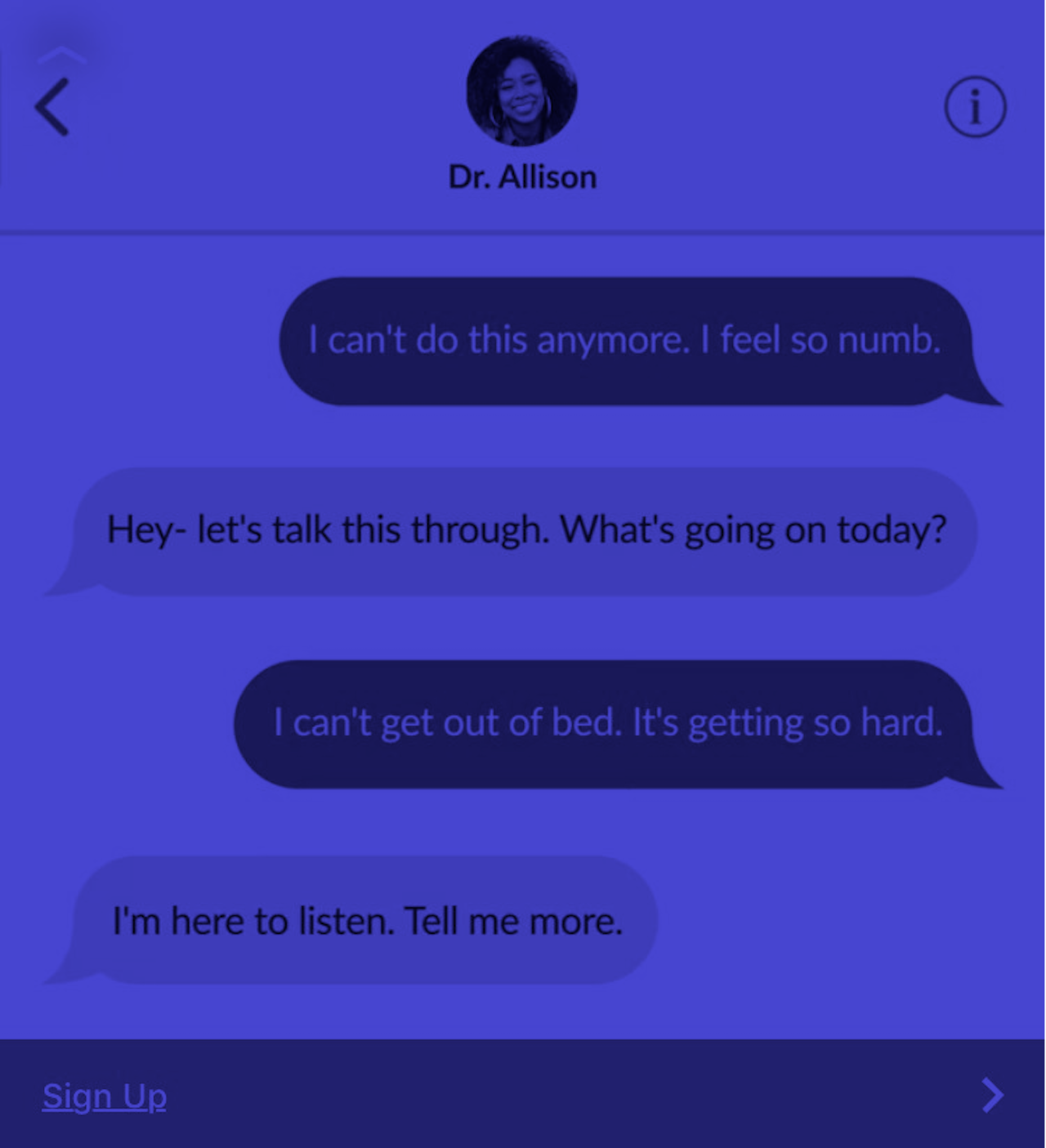Sheyda Brown had seen the ads for BetterHelp time and time again, on social media platform after social media platform, before she decided to sign up. Though she’d never tried text therapy before, the service’s allure was hard to deny. Who wouldn’t want a caring licensed therapist at their fingertips, only a simple text away, all-day every day? Especially if it was supposed to cost, as explicitly promised by nearly all text therapy sites, “significantly less money than traditional therapy.” Brown had a busy schedule and found the cost of traditional therapy to be way too high, so she figured BetterHelp was at least worth a shot. “I just wanted something more in the moment,” Brown told The Outline. “Like a conversation in the moment while i'm thinking about an issue. To kind of like, work through it right then and there.”
The Outline spoke with 6 current and former clients of Talkspace, BetterHelp, and Pride Counseling (one of BetterHelp’s many subsidiaries). Each turned to text therapy after being inundated with ads for the service on social media. All but one expressed concern over the inadequacy of the care they received while using text therapy, and the exorbitant price associated with that low-quality care. Some of those interviewed requested anonymity given the stigmas surrounding mental health.
Most of the ads Brown saw lauded the company’s seven-day free trial — a promotion she confirmed was legit after reading dozens of reviews — so she figured there was no harm in trying and signed up. “I kind of thought it would be like a tech service, like while I was texting someone it would be be an ongoing conversation, and so one of the things that I really disliked about the service was that it wasn't that way at all,” Brown told The Outline in a phone interview. “Someone would check in maybe once a day, so basically it would be just like one long message that I would send and then they would send one long message back — and I didn't even hear back from anyone until the second day.”
This is the most ridiculous service.
After three days of sporadic and generally unhelpful “counseling,” Brown tried to quit; the service obviously wasn’t for her. Seconds before hitting cancel she realized that, despite the fact that she had clicked on the seven day trial ad to sign up, BetterHelp had already charged $250 — a month’s worth of text therapy fees — to her credit card. She was instantly furious. Her therapist pointed her to a customer support line, which denied her claim to the seven day free trial (apparently they “don’t offer the trial to everybody”). Customer service insisted that a total refund was out of the question; she at least had to pay for her first week, as she did use the service for three days. Brown called her credit card company and reported it as a fraudulent charge.
“Honestly at this point I’m more frustrated than when I came to you all and you're exacerbating any issues I had previously. ” thought Brown at the time. “This is the most ridiculous service.”
Unfortunately, Brown’s experience is anything but out of the ordinary. In the sketchy and seemingly-boundless world of text therapy, unresponsiveness, frustration, and confusion are practically industry standards.
The lengthy FAQs hidden in the navigation bar of most text therapy sites are often peppered with CVS-receipt-long lists of studies (most of which have glaringly small sample sizes) comparing text therapy to traditional. While there are a few which claim the two forms have similar success rates, there’s a noticeable lack of peer-reviewed research on the matter that has both robust participant pools and smartly designed control groups. Text therapy is also relatively new phenomenon, so there aren’t many studies comparing its effectiveness long-term to more traditional methods.
“I first found out about them because they partnered with a semi-large YouTube channel I subscribe to,” said one former BetterHelp client, who spoke to The Outline over private message on the condition of anonymity (given the various stigmas surrounding mental health). “This channel advertised them as basically somewhere to seek help online when you didn’t have money or the means to get therapy face to face.”
The BetterHelp ad is wedged into the tail end of a video entitled “[ASMR] DOG EATS TOAST(+Special Announcement).” After roughly a minute of a Shiba Inu loudly crunching on some slightly burnt bread, the (human) YouTuber announces his new partnership with BetterHelp, describing the online service as the perfect alternative to pricey traditional therapy.
“I was under the impression that it would be a LOT cheaper than seeking face to face help,” the former BetterHelp client said. But she soon found that the service she had signed up for was significantly more expensive than she’d anticipated. Text therapy through BetterHelp (or through any of its offshoots, like Pride Counseling, Faith Counseling, or Teen Counseling) costs between $140 and $280 a month, depending on the plan purchased (perhaps cheaper than paying out of pocket for a real-life therapist, but not by very much). As exorbitant as that may seem, Talkspace, another popular text therapy site, charges even more: a month of text therapy costs between $196 to $316. This is a considerable increase from Talkspace's 2016 prices, which were $128 and $276 respectively.
So what does hundreds of dollars a month get you in the world of online therapy? For most, not much.
"Talkspace does not have a free trial, and offers subscriptions that renew every one, three, or six months," Michael Kuznetsov, VP of Marketing at Talkspace, said in a statement to The Outline over email. (BetterHelp did not immediately respond to a request for comment.) Specifics regarding these fees are also rather difficult to parse before signing up. I spent multiple hours combing through BetterHelp’s many websites, and I was unable to find details regarding exactly which pricing tiers were available and what the differences between them were.
So what does hundreds of dollars a month get you in the world of online therapy? For most, not much. “I only interacted with one counselor, who basically seemed to be uncomfortable with text-based interaction,” a former Pride Counseling client told The Outline over private message. “I got the impression that she was on mobile, as she could not type quickly. She asked me many times to do a video chat” — a request some text therapy companies require their therapists to make, according to The Verge, as it apparently costs more — “which I repeatedly said I was not comfortable with. She also didn't give me any substantial feedback and justified it by saying her job was to ‘let [me] talk it out.’ What it boiled down to is that she seemed to be half-assing it and wasn't a good listener.”
Compare this to what one current BetterHelp client, Andrea Lambert, told The Outline. “The quality of care I receive from Pride Counseling is excellent and uniquely tailored to my special needs,” she said over email. “We communicate through email, which I can do as much or as little as I need to. My counselor always responds in a timely fashion, usual a few hours later the same day... The first week I was emailing my therapist nonstop and she kept up, giving me a bunch of great breathing exercises for my anxiety and PTSD that have really helped.”
Online reviews of the apps paint a different picture. “Kept seeing ads for this on social media, figured I’d try it out,” wrote one user about Pride Counseling. “I fill out their survey, give them my email, and then they tell you the subscription price lol. They charge you monthly, so the initial payment is $180. I’m upset because I already gave them my email and I don’t need the spam. Had they just been upfront at the beginning of their screening survey that they were gonna charge more than the price I see a face to face therapist for, I would have known to stop proceeding…”
“This company charged my account for services I asked to cancel before I received anything,” wrote another. “I have not heard back from them. I have repeatedly tried multiple types of communication with no response. Unacceptable. Fraudulent. Do not use this app…”
What it boiled down to is that she seemed to be half-assing it and wasn't a good listener.
The quality of care experienced by text therapy users is anything but consistent. What holds true for one client is rarely applicable to the next. Part of issue is that text therapy companies like BetterHelp and Talkspace may seem like medical providers, when in reality they’re merely platforms. Customers may think they’re getting matched up with a BetterHelp employee when they sign up for the service, they’re actually just paying BetterHelp to put them in a private chatroom with an independent contractor.
BetterHelp’s Terms and Conditions agreement quite literally says that it “do[es] not control the quality of the Counselor Services and [it does] not determine whether any Counselor is qualified to provide any specific service as well as whether a Counselor is categorized correctly or matched correctly to you.” The company repeat time and time again that it’s merely a platform for connecting customers and independent contractors — not a mental health services provider — and forces any potential user to explicitly acknowledge that BetterHelp “do[es] not represent to verify, and do[es] not guarantee the verification of, the skills, degrees, qualifications, licensure, certification, credentials, competence or background of any Counselor.”
These sorts of details are likely why platforms such as BetterHelp and Talkspace don’t exactly have the best reputation when it comes to taking care of their independent contractors. A 2016 investigation by The Verge into Talkspace “described an atmosphere of micromanagement and disillusionment, a therapy clinic placing too big an emphasis on client retention at the expense of therapists’ well-being. All but one of the therapists” interviewed by The Verge “expressed concern that the company doesn’t place enough focus on patient safety.”
Despite the fact that the fleet of (supposedly) licensed therapists employed by text therapy companies make up one half of the whole business, and the clients the other, neither group seems to be adequately served by the services provided. The ad practices and signup tactics employed by these companies could be described as predatory at best, and potentially dangerous at worst, leaving both clients and contractors hung out to dry in the name of profit.



